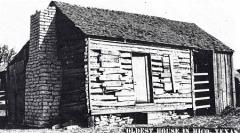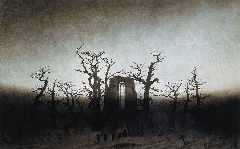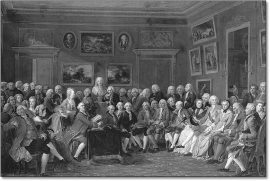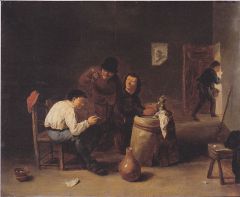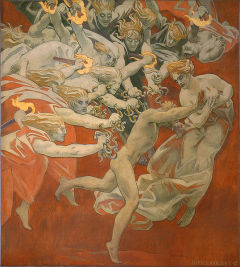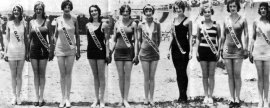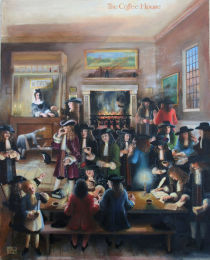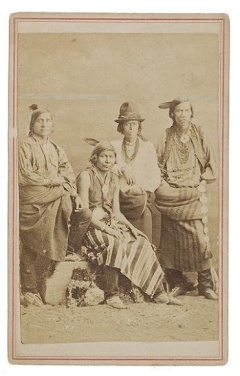The Ghosts of Justice
A Halloween Story
By Steven D. Malone
Making Texas Justice
They robbed Ike Malone in his bed. The aging frontiersman broke his hip in a fall. He was bedridden and his friends and second wife, Eliza Jane, cared for him. Acting on rumors that Ike kept his money hidden in stone jars, three men attacked his house. They forced those present to stand together between Ike’s bed and the fireplace while they threatened and abused the ailing old man. Family legend says that Ike refused to give them any information and told them they could go ahead and shoot him because he would die soon anyway.
Frustrated with the tough old man, the bandits left.
The alarm sounded. The people of Hico rallied and rode down the bandits near Waco. The posse returned the culprits to Hico and locked them in a log shed that served as a jail. In the night when the guards were ‘away eating supper,’ a mob came to the shed and killed the robbers by shooting through the chinking between the logs. Hico citizens placed the bodies on display for several days so people who came from miles around could ‘view the end of a life of crime.’ The bandits’ take from Ike Malone’s home had been one silver dollar.
Making Texas Ghosts
Hico citizens deemed the shed “The Slaughter Pen.” These were not the only men that met Texas justice there.
They did not, however, find peace in the Slaughter Pen. The following article appeared in the town’s newspaper several years after the events:
A Haunted House In Hamilton County Where Several Men Had Been Killed.
From the Hico Times.
In Old Hico is a house in which, at different times within the past 30 years, some six or seven men have been killed for divers offenses. The house, which is known as “The Slaughter Pen,” is situated on the farm of Mr. G. H. Medford, and occasionally some renter moves into it, and also moves out in haste, and the house is rarely occupied it is said the place is frequented by the restless and disembodied spirits of the man whose material existence was so suddenly terminated there, and the result is edifying only at a distance and in broad daylight.
The parties whose mortal coils were shuffled off forgot, on the spur of the moment, to remove their boots, and they therefore, make a great deal of unnecessary noise in their midnight peregrinations, and are anything but seemly and fastidious ghosts. They also seem to be on unfriendly terms with each other, and their bickerings are so open that the neighbors have noticed it and deprecate the lack of secresy that the skeleton in the closet observes. The last addition to this select circle of ghost were two gentlemen who about two years ago, stole some money from old Mr. Isaac Malone.
They were found in a barbershop in Waco and brought back and placed in this house. During the night, while chained together near the fireplace, their spirits escaped to another world. Since then these two ghosts have seemed rather “stuck up" to the other ghosts, probably because they were clean- shaved and wander off to themselves, clanking the chain to irritate the other low-down ghosts. We've noticed that fresh shaved ghost always act this way. The old ghosts retaliate by driving these two away, as, having branded the wrong yearlings only, they cannot associate with ghosts who steal.
Because of these quarrels it is very disagreeable to remain in the house at night.The last occupant moved out two weeks ago, because, as he told Hol Medford, a barrel of pistols had been thrown into the house and all fired off at once; he didn't mind the ghost, but he said the pistols were really dangerous. He was an Englishman and hadn't got the hang of Texas ghosts.
(As reprinted in the Brenham Weekly Independent. Vol. 1, No. 15, Ed. 1, Thursday, April 20, 1882, page 5.)
Dead To Me
By Steven D. Malone
8/22/15
This post wrote itself with difficulty. It is not a happy one. It is one needing writing before going on to better things.
I had a friend once. A friend of my youth. A friend of my early adulthood. We worked together. We starved together. We partied together.
I cut him loose some years back.
I had to. He slowly evolved into a vampire. Sucked me dry of all emotions in a one way giving, wishing, and hoping. Wanting him to have a better life than he had. He devolved into drugs and alcohol. He used and he used me.
Don’t know how it happened but suddenly, lightning strike sudden, I realized I became his enabler.
I’ll spare you the details. I cut him loose.
Long story short.
Long story short, my overly curious wife looked him up on ether clouds via her almighty laptop.
He died.
Two years ago, more or less, as it happened. Such was the gulf, the silence, of cutting loose that I did not hear about it. I was not the only one among my old posse cutting the poor man loose. Such was the gulf, the silence, that no one heard.
Hard hit.
I was surprised at how the death struck me in my heart. It had been a while and our friendship had taken some hits through those last years.
Hard living and hard choices may have been the cause of his passing. I don’t know and I probably will never learn. No cause of death showed in his all too brief obituary. No links to his family remained in the listing.
He is not the only of my friends that I cut loose.
Hard take.
I’ve cut out two friendships in cold-blooded premeditation, not in just the slow evolution of life changing.
Two that ossified. Two that became burden. Two that depleted everyone and everything around them.
The one dead. The one still alive - as far as I know. The severance is as complete as I can make it.
The cuts took from me illusions (delusions possibly) of the fidelity I devote to but few in this world.
Hard loss.
Loyalty means something to me. The oath I swear to myself. The fidelity I give and that I expect in return. I don’t give that easily. Breaking that oath, withdrawing it, wounds my heart, my soul.
An amputation.
Had to be done. Sever. Lop. Bleed.
Admit it.
My life turned when I did it. For the better. Difficult to admit. True none-the-less. Great weight lifted from my shoulders even after a tinge of guilt colored the recesses of my mind. Good friendships that enriched my life got focused on. The emotional bleeding staunched. Days were brighter. Nights less haunted.
Still, I cut. I walked away. For some I would not - I will not - be there until the bitter end.
So swear.
I swear oaths. I sign on the dotted line. I promise. I will hold to them. However, the deeper oaths. The truer oaths. Those I make to myself.
The ones I made to myself are the stronger ones.
Make due.
Make that oath to those you swear fidelity to. Add to their lives. More important, make that oath to yourself.
Deliver.
Don’t, however, keep to those that sap your love and your strength and your spirit. Amputate. You’re due a good day and an easy night. You owe these to yourself. You owe these to those that hold to you as you hold to them.
Dead to me.
They say - you know, the capital “T” They - that among the stages of grief is that of anger. We are supposed to be angry at those dead who went and left us.
Bite me, ex-friend. I’m mad that I broke my self-sworn oath to stand with you to the bitter end. The bitter end came too soon - twice.
Death is ugly. Death has no heart. I know no one that got the death they deserved. I know of no friendship that got the end it deserved.
I try hard to believe that death is not God’s way of taking all of your toys and sending you to your room. So I hope your room is a peaceful place, my ex-friend.
Quotes at the end.
And yet it is always a surprise when it happens to someone we know.
― Lemony Snicket, Horseradish
I have lost friends, some by death...others by sheer inability to cross the street.
― Virginia Woolf
Light thinks it travels faster than anything but it is wrong. No matter how fast light travels, it finds the darkness has always got there first, and is waiting for it.
― Terry Pratchett, Reaper Man
Second Sight -
Notes on Writing Reviews
6/23/15
Question. What is it that authors are most often asked?
Often enough it’s will you read my book and tell me what you think of it? Well, that’s two questions. The following third one is will you write a review? A real one of course. Be honest.
Shhhh. Deep down in my soul the last thing I want from another writer is an “honest” review. Give me four stars damning me with faint praise and send me your real thoughts in a very private email. You know, so I can learn and get better. (That’s actually a lie. Give me all the 5 star praise you can muster. Build up karma points. Have my next kid named after you.)
Reviews are for readers.
I often get asked to write reviews. I’m not alone. Tis the burden of most published folk, I think. Girlfriends asked me to review their poetry in my youth for even saying I wanted to be a writer. I’ve even written a review or two for the asking.
Most of the reviews you find under my name on amazon were not done for the asking. They were done because I had something I wanted to say about the reviewed book. I wanted to say it because I wanted to share the book to folks that may never have known it.
A couple were done for the asking. A peculiar feelings simmers somewhere down deep over those that has nothing to do with writing those reviews or for the gift of doing it for the asking. A weird wonderment.
I’m not sure we do each other a “good” when we review for our writer friends. I’m not sure we do ourselves a “good” when we review for a writer friend. There is a great conflict in my soul writing reviews at anytime.
Do I review for the writer or do I review for the readers?
Reviews are for readers.
By chance or some cosmic design my reviews done for the asking have taken me out of my comfort zone. What do I know about the turmoil of a gay young man growing up in conservative rural America? What do I know of Jewish families struggling under Nazi controlled Eastern Europe? Well, more now than I did before I read the books.
On my platter right now is a book of poetry spanning generations of people in the Heartland. And one is a cross genre western/mystery. The poetry is moving me more than any poetry written in the last century. He’s added to a list of four modern poets I like.(I found them all on Google Plus. Add me.) The Western writer and I share several interests though as a rule I’ve read few Western authors since Louis L'Amour.
The last couple of months, I’ve had seventeen - seventeen - beautiful authors ask me to review their work. I’ve “maybed”, I’ve hedged, and I’ve refused all but the two I mentioned.
Now, I’m all for coming out from my comfort level. I’ve sort of made a cottage industry of that most of my life. I’m a child of 60’s after all.
But the struggle is there. Reviewing for a writer is, to me, a critique, or should be. No good is served to the writer or to readers doing it any other way. And, again to me, critiques should be done privately like editing.
Not the grammar police job either. What’s with that anyway? All power to you, grammar police. I certainly know I’ve offended you countless times. Many of you have let me and my readers know. I feel lucky that I’m not that kind of a reader. I, usually lost in the story, rarely see more than the most glaring errors. I’ll send you a note. I’m not grading your paper and only maybe will the gentlest of mentions ever enter my reviews - if it’s badly marred. I’m reviewing not proofreading.
Reviews are for readers.
Reviews are for readers. They should inform. They should encourage or discourage a reader from picking up a book. They should provide a hint of expectations. For good or ill, readers come to a book with expectations.
Like a good whore, books are bought to scratch an itch. To fill a need or an emptiness not gotten in real life. They are to take one to places one doesn’t usually get to go but wants to.
Writers? Do you expect your reviewers to pimp your books? To be honest, I wouldn’t mind that from a reviewer. But, if I review a book, I risk sending readers to one that scratches better. Even positive, 5 Star, reviews can turn a person away from hitting the “Buy” button if it cannot or does not promise that the itch will be scratched.
Who reads reviews anyway?
“Reading book reviews is like asking other people to chew your food for you.”
― Ron Brackin
And, remember:
“A critic can only review the book he has read, not the one which the writer wrote.”
― Mignon McLaughlin
Net Fishing, Net “Intering”, Net Working
Or, Attending the Writer’s Conference
5/11/2015
Two weeks ago, banging up against my much anticipated 7 day cruise to the Caribbean, I packed my ink gel pens and my legal pads to venture into the big city to join fellow wannabe’s at a Writer’s Conference.
Maybe you’ve been to one. Swank hotel, parking only a short mile or two to the meeting rooms, coffee and donuts piled on a groaning table, loads of books displayed for sell by wistful authors, elbowing through competing groups of techies and medical product sales reps, close by restrooms for your convenience, a great host of the aspiring seeking that one secret yet to be found that surely catapults you to fame and fortune. You know, a writer’s conference.
Of course, the best things about a writer’s conference are the hungry-eyed, hopeful, newbies eager to learn all there is to know about their craft. They wander about eyes wide like children window shopping at Christmas, asking foolish questions, pacing, exchanging sheepish smiles, pumping the hands of anything resembling an author.
Add to these the fair number of “Arteeeests” like many of the folk haunting “The Arts” who are hopelessly enamored with themselves and strive to show off their accomplishments with the cutest prattle and deafest ears. Not a criticism, they delight me just as much as the newbies and I feel their “pridefulness” justified. I look forward each time to basking in their glow.
And include those few workaholics with Type A personality traits marching around hither and yon making things work despite frightfully spoiled presenters, late arriving caterers, lost attendees, and the fact that a late night thunderstorm knocked out the power. I salute them for without their efforts no conference would happen.
Pure eye candy. Couldn’t, wouldn’t, miss the people watching.
I went to as many presentations as I could crowd in. Many were offered and making choices was most difficult. Two themes are required these days. Craft and Selling. How to write and how to sell what one writes. Selling, very important, very crass, and the bane of existence for all modern authors since publishing houses don’t do much of that as they once did.
(Come on folks, I just want to write. If I wanted to sell I’d be showing you a vacuum cleaner instead of this.)
Anyway, as this is a blog post and not a novella, I can only share a bit of the encyclopedia of new and/or worthy information I gleaned from the event.
The function of evil is the eventual creation of wisdom. - Marian Szczepanski
The first presentation I wish to talk about is:
“Beyond Voldamort: Crafting Credible Antagonists” given by Marian Szczepanski
Ms. Szczepanski tells me that for a story to have a pleasing complexity there might take place a meeting of evil and grace. It might have (sorry), it should, it will, have conflict. Conflict takes us to the answer to two questions. One, what is at stake? Two, who is at risk?
Your antagonist is there to create that conflict.
So, why an antagonist? The reality is that bad people exist. They exist in fiction as well. They happily create obstacles for our protagonists. A hero’s journey requires set backs. And, antagonists provide a behavioral counterpoint to our hero.
For readers, who are voyeurs at heart, antagonists are interesting. Readers share some complicity with his/her badness. They, we, get to vicariously explore dark ideas and impulses, even actions, usually inhibited. Usually.
Literature can serve as an entry point to ponder, to allow exploration of, cosmic justice if it exists.
An antagonist exhibits normal human emotions. However, these are taken to abnormal extremes. Greed, ambition, lust, envy, hubris, revenge, bigotry, fanaticism, sadism, the persecuted becoming the persecutor.
But remember, the antagonist is the hero in his/her own story. The decision of who is bad is the decision of “Point of View”.
Make no cookie cutter villains. Nuances are essential. Allow contradictory characteristics. Inconsistencies keep interest and may even allow some of the reader’s empathy to crawl in. Antagonist may even be conflicted about their actions.
Even unlikeable characters may have at least one redeeming quality. That said, adding these characteristics will have to be done in “back story” that does not dominate your narrative.
And, finally, an antagonist doesn’t have to be a person, an alien, or even a monster. An Antagonist might be setting, the forces of nature.
Here comes everybody!
The second presentation I wish to talk about is:
“The Digital Age Author” by Jane Friedman
Ms. Friedman told us some down and dirty suggestions and some great links to learn of what’s coming at us in this new age.
I was glad for this seminar. My son long and often accuses me of living in the century before the last one. As I wrote this first draft with a fountain pen I admitted to the truth in this. I tried not to think that I am alone even watching most of the others in the meeting room take notes with their tablets. (You should have seen me struggle at the Scrivener seminar last month. Thanks for the help Vanessa.)
Metadata increases sales! Again, metadata increases sales. Learn metadata. And when you do, explain it to me.
Beyond using metadata, Ms. Friedman showed us 5 suggestions for new authors in this new digital age:
First; “Partner”. Authors are a lonely, isolated bunch usually content with the hermit life off in hidden ivory towers. We don’t have to go it alone.
Second; Control your online presence. Get a website that shows off your work and links to where to purchase copies. Blog to establish your creds as a writer and an expert in your genre. Get around and be easy to find on twitter, Google +, Facebook, etc.
Third; Find out how to directly engage with your readers. Be as helpful to them as you hope they will be to you.
Fourth; Write and publish -but- collaborate and foster community. See suggestion the first.
Fifth; There is only one model, only your model. Keep it something you love. Don’t blindly follow everyone you hear. (“If I had to give young writers advice, I would say don't listen to writers talking about writing or themselves.” ― Lillian Hellman)
Signing off
The orgy of writing wisdom continued through many seminars and meet-and-greets. Too many to give justice to.
The crowning event (for me) of Houston Writer’s Guild’s Spring 2015 was the book signing. I had a short story, The Queen of the Elves, accepted in HWG’s Tides of Impossibility. It’s launch helped open the conference. Please check it out:
The Meaning of Life and Everything
2/20/15
“The room smells like pickles.”
The below is a highly paraphrased version of a story from the early 70’s. Ancient history so I believe it came from a comedy album by The Firesign Theatre. Don’t remember which one.
An acid head lay in his bed late one night grooving on his internal light show and letting acid ideas roll and stroll through his mind when he found the answer to life and the universe. Brilliant. Sublime. But he knew his condition and he knew he would forget it by morning. So he jumped up, ran to his desk, and wrote it down. Later he slept. When he woke he remembered that he found the answer to the universe and everything. He jumped up, crossed the room, and seized the scrap of paper. It read: “The room smells like pickles.”
The Hitchhiker’s Guide to the Universe asks of a supercomputer named Deep Thought the answer to the Great Question Of Life, the Universe and Everything. If memory serves here, Deep Thought thought about that for millennia. With “infinite majesty and calm” Deep Thought said: “Forty two.”
The great mythologist, Joseph Campbell, knew life had no meaning. Asking the question itself was wasted time. A waste of time for we, being alive, bring meaning to it. We are the answer.
Philosopher Franz Kafka tells us that the meaning of life is that it stops.
Once pondered
In the bitter/sweet days of youth, my friends and I pondered the true meaning of Life, the Universe, and Everything. Kinda felt we had to as the world we knew was one of psychedelic chaos and meanness. It was the sixties after all. Everyone and everything, it seemed, was played with life-and-death seriousness. And for no reason we could understand for all our sweet and innocent pacifism, our hedonistic indulgences gathered us some deadly serious enemies apparently bent on sending us either to jail or hell. The world spun out of control seething with war and death and greed. We had been cast out by our families, our neighbors and our country. Or so we thought.
So in the nights, in the forests, or on the floors of what shelter we could rent, around a meager fire we wondered, we read, we talked.
We absorbed the guiding lights of our times. LSD advocate, Timothy Leary, told us to “question authority”. Thinking for ourselves, or so we thought, we decided, in the newness of our life, to call all things - all wisdom - “authority”. We questioned everything and everyone. Certainly the leaders of our living world, the politicians and the preachers and the parents and the police, we questioned. Most of them wanted us in jail and pulled pistols to try to make it so. We questioned the world’s communal wisdom. The Bible, the Constitution, Mein Kampf, and Marx. And we weren’t even sure about the Beatles, Bob Dylan, Abbie Hoffman, or Maharishi Mahesh Yogi. We questioned ancient wisdom, Plato and Socrates, Buddha and Lao Tsu, you name them.
We were the children of the “Post-Sputnik”, Space Race, Eisenhower, and Cold War education system. Can you tell? Raised on “Duck and cover” atomic fear and bloodless gun fighting westerns on TV, we were meant for becoming corporate serfs and for beating the Soviet monolith.
Twice pondered
The answer(s) just had to be more visceral than we read. Than we heard. The layers upon layers of “civilization” just had to be stripped off. Maybe there was such a thing as the “noble savage”. Maybe there was such a time where Man stood in a natural state in a natural world. Maybe, just maybe, that can be reached again. Many of us Tuned In, Turned On, Dropped Out and pondered.
Who needed stuff and things? Who needed wars over market shares clothed in patriotic, religious trappings? Who needed the Gods of our fathers?
Keep it simple. Bring back the world where you honored the rabbit that sacrificed so that you may eat. Bring back the world where fruit was plucked from Eden’s trees. Bring back the tribes that had no slaves.
Mostly get high, get naked, screw, and feast.
Surrender
That lasted maybe a year, maybe two, for most of us.
It took work to keep the goats fed. It took work to macrame that shirt. Odd jobbing it with hammer and trowel just wasn’t getting me fed. I am the least handy of handymen there is. Besides, peace symbols became prizes in cereal boxes and there was yet another land war in Asia.
The “Revolution” was over. The bill became due. Where could I go to surrender?
Conditional surrender, though. Hardheaded me wasn’t about to let go of it all. Much of what happened to me was good. Maybe I could compromise. Maybe I could find some good in the world that actually was for we really weren’t going to change it. I certainly wasn’t.
Possibly, like the Buddha thought, there might be a “middle way”. A path between both sets of extremes. Maybe there was a quiet place in the rending as the extremists tear at the world.
I went looking. I look today. Sometimes I find it at least for a few short moments every now and again. If I work at it.
As Edgar Allen Poe once said, “the best things in life make you sweaty.”
Meaning
Meaning? Purpose? Joining?
Friends, and even enemies, tell me that they found their life’s meaning in drugs, in family, in religion, in devotion to a cause, in work, in their art.
All of those I’ve tried. Each is good in its own way I guess. Who am I to judge? For an answer to the meaning of life, the universe, and everything, I don’t know. I don’t feel I found the answer in any of those things. Not a real or a complete answer.
These days, I try not to be bothered too much about the question. The greatest minds didn’t find it. And, if they were honest, they said as much. Any answer must be taken on as a choice and with a leap of faith and a selective deafness to any debate from those with different answers.
That there is no answer might be a good thing.
Wiggle room
“My life has no purpose, no direction, no aim, no meaning, and yet I'm happy. I can't figure it out. What am I doing right?”
― Charles M. Schulz
“I tell you, we are here on Earth to fart around, and don't let anybody tell you different.”
― Kurt Vonnegut, A Man Without a Country
Write Me a Catharsis
2/6/15
My creative writing teacher gave that, gave the class that, assignment once a long time ago when the world was young.
This stopped me short. I thought I knew that word, ‘catharsis’, but was not sure. I probably had to get it right for the professor already thought me a troublesome student. He had pretensions to a classical background, issues of his own, and a positive hunger to generate his idea of good writers. You know, literary types. I stepped out of his box and produced not literary work but pulp-like work on most of the assignments. Back then I still thought I could make money as a writer - you know, seeking out a ‘popular’ audience - an audience of ‘the people’.
I asked for clarification. He left it vague wanting us to have literary latitude.
Catharsis.
Back then I thought doing a catharsis was staunching a wound. Like they did back in the olden days. Slapping hot iron to it to stop the bleeding.
I learned that, closer to my professor’s point, catharsis is more like lancing a puss-filled, tumorous, sack of pain growing on one’s soul. The writer uses writing to lance the wounds inflicted upon him or her by his (or her) upbringing, or lost lovers, or some life trauma. To exorcise, to purge, maybe to orgasm away past hurt or past want.
That said, looking around today I’m finding my idea of catharsis is evolving. Staunch, to purge, to exorcism, to rant.
Catharsis is highly recommended. Google it. Exorcising one’s demons with the pen or the keyboard is promoted in thousands of posts, lessons, and encouragements.
Surely one sees cathartic writing on every literary landscape as writers explore romance they never seem to get for themselves, or the trauma of an abused youth, or demonic addictive lives, or rants against polar opposite political philosophies. Bookstore bookshelves groan. Blogosphere blog posts bark. Magazines and ezines zing.
Oops. Stopped short again. Just how much cathartic working it out seeped into my writing? Just what were my issues? What are my issues?
Well, dang!
I will admit to more than a few nerdy wet dream lit of that handsome, clear-eyed, buff hero and darling of all the pretty girls - that Tarzan that surely I wanted to be but was absolutely not. I guess I will also admit to those few (or many) semi-pornographic erotic conquests of all those fantasy women (girls) I wanted but could not have in school. Strange, my mother never, but never, appeared in any of what I wrote. And none of my male protagonists ever had an easy relationship with his father in any of my stories. You know, Boomer, Generation Gap, all of that.
Rants
Heaven spare you my rants. My ranting is always my worse writing.
Rants are ever more included among cathartic writing. Proponents of cathartic writing include them in a therapeutic regimen. The benefits are extolled. Let’s all get it off our collective chests. You first.
Your assignment. Google cathartic writing. Scroll down and down and down some more. Sooner or later you will discover that not all agree. Some studies, well done studies, find different.
Subjects are assigned cathartic writing. Like I was (it must have been yukkie stuff for, hoarder that I am, I can’t find that paper). Measurements are taken. Interviews are given. Questions are asked. By most metrics, the subjects do not feel better for having vented, purged, and exorcised.
Subjects are given cathartic writings to read. Measurements are taken. Interviews are given. Questions are asked. The subjects do not feel better for having read them. Often the subjects are left angrier not relieved, not released from their demons.
http://scottsworlds.blogspot.com/2013/07/the-myth-of-catharsis-why-ranting-and.html
http://youarenotsosmart.com/2010/08/11/catharsis/
Let me play the Hitler card here. Hitler’s cathartic writing did not seem to purge him of his demons. They didn’t do Germany much good either if history is a judge.
Preachers, pols, curmudgeons, satirists, any number of lost souls, put out their catharsis for our edification. Entertained? Well, sometimes. Healed? I guess you will have to ask them. I don’t see much healing being done among their captive audiences.
But Steve, it feels good!
Yeah, yeah, it does. You feel better when it’s written. I feel better when it’s written.
Here’s my fix. I think that after the catharsis of purging with a pen we should give ourselves a time out. Often our “spleen” can be cooled with a 10 count. And, often, this is just as healthy.
Mark Twain said: “The writing begins when you’ve finished. Only then do you know what you’re trying to say.”
After the spewing purge, treasure may be found. Gems. Grist for the mill. In rewrite there is true literature. I might try turning ire into satire. Turn vent into value. Fume into philosophy. Maybe I can find healing in my helling and everybody leaves smiling.
Barring that, maybe I can just leave it all locked in my journal and go ahead with work on my WIPs.
Pulchritude
1/30/15
Pulchritude.
Pulchritude: n. physical beauty; comeliness. from Latin pulchritūdō, from pulcher beautiful.
The Urban Dictionary goes a bit further: Pulchritude denotes beauty so extreme that it creates a grotesque state of excess. Note that pulchritude is not a mixture of beauty and grotesqueness; rather, pulchritudinous persons or objects are only grotesque in that their beauty is so awesomely disconcerting as to render onlookers trepid, if not to repel them altogether.
Nothing like beauty in a grotesque state of excess.
I do so love that word. I even love its adjective: pulchritudinous. Well I did love it more yesterday than today.
I loved it for what pulchritude is synonymous of. I loved it for its pure shape looking at it on the page. I love it for how it rolled on the tongue when said.
Well I once loved it for how I thought it was pronounced. Researching for this article took some of that away. Yesterday I thought pulchritude was pronounced ‘pul’ as in people, ‘tra’ as in the ‘ch’ sound of the beginning of truck, and ‘tood’ as in dude. Pul-tra-tood.
I find, however, that it has a hard ‘ch’ or k in it. Pul-kra-tood.
But, I have digressed.
The International Pageant of Pulchritude is on my mind today for it is the mother of all beauty pageants (it is the beginning of the Miss Universe contest) and the recent controversies got me to remembering.
The Pageant is a Texas product, Galveston to be exact. Born in 1920 as the Annual Bathing Girl Revue. When ladies from foreign parts began to enter the contest in 1926 they changed the name to The International Pageant of Pulchritude and they started calling the winner Miss Universe. The “leg show on the seawall” became so popular that crowds of more than 150,000 people gathered to watch the bathing suit parade on Galveston Blvd.
By 1932, the Depression, the morality campaign of Bishop C. E. Byrne, and criticism like that of chewing gum magnate Colonel W. E. Easterwood (who quipped “the foreign contestants wore enough makeup "to paint the Washington Monument") brought the contest to an end.
(From Wikipedia: Today's Miss Universe pageant was founded after Yolande Betbeze, the winner of the 1951 Miss America pageant, refused to pose in a swimsuit from its major sponsor, Catalina Swimwear. The brand's manufacturer Pacific Mills withdrew from Miss America and set up the Miss USA and Miss Universe contests. The first Miss Universe Pageant was held in Long Beach, California in 1952.)
Girl watching.
My pagan friend, Judy, says that boys have a nerve that runs directly from their eye to their “woo-hoo”. I don’t know if that is true but it seems so.
Girls, we’re boys. We just can’t help it. Posed and poised, you girls are a delight. In motion, you are shear poetry. You just can’t help it. You turn our heads. I think this has been true since before humankind walked erect. (Pun intended.) I feel that it is the nature of beauty that I and others who are “the girl-watchers” are helpless before the wonders of nature.
From TV Tropes:
Two (or more, or not so many) men look at a bunch of women and discuss them. Or vice versa. An old, old trope, but given that guys do this every day, likely to continue till mankind goes extinct or at least until men do.
I know that there are those that descend into gross rudeness, even ugliness. They do, in fact, ruin it for the rest of us. The men with no respect. With no sense of the great gift you woman are to us and to the beauty of the world. I condemn them.
I subscribe to Donald J Sauers (in The Girl Watcher’s Guide, 1954). "Although we believe that girl watching has it all over bird watching, we feel that these two hobbies do share one important feature. They are both genteel. They both respect the rights of the watched ... A girl watcher never leers, nor does he utter any sound which might betray his joy."
That said, I know that there remain women, justifiably angry and unsettled, who will continue to remind me; “Hey, I’m up here.” Do please forgive me the god given disability.
So, I will close with “The Men’s Prayer” (The Red Green Show, CBC):
“I’m a man. But I can change. If I have to. I guess.”
Waitin’ for My Coffee to Boil
1/16/15
It’s my Grandmother’s fault. She started it. It’s the olfactory, see. My grandparent’s house smelled of secondhand smoke, whole wheat toast and percolated coffee. Grandmother’s house meant spoiling, great food and Christmas presents. You know, true and unconditional love. Smoke, toast, and coffee are the smells of love.
That said, staunch Southern Baptists, that we pretended to be, forbade the adult pleasures of cigarettes and coffee. Those ranked equal among the sins with liquor, fornication and dancing.
My brother and I knew, of course, that our folks and grandparents and most of the congregation danced, smoked, and drank both libations. With Southern Baptists the trick, and the deal you make with God, is to not get caught dancing, smoking, or drinking. My family was pretty good at that.
I have a vivid memory of my first cup of coffee. Back in the day there were no super highways. The route between far northwestern Louisiana and far southeastern Texas took all day through rolling, forested hills and little country towns. One stopped at the scattered roadside parks made of several cement picnic tables, cement fire pits and garbage cans of discarded oil barrels. Granddaddy hopped a barb wire fence for a stroll among the pine trees and Grandmother opened a thermos of her strong, dark roast coffee.
On that sunshiny day of my early puberty, perched on the cement bench, I watched my Grandmother pull out the sandwiches and potato salad for our picnic then opened her trusty thermos. Four hours into the trip the thing still steamed.
“Umm, smells good,” I said.
“Well, you’re old enough,” she said but I believed she just didn’t want to drink alone. “Want some?”
“Sure.” How grown up I felt just having her make the offer.
My Grandmother was no fool. Out came the milk from the ice chest. Out came the sugar from the basket. You might say that my first cup of coffee was more like a hot chocolate than one of coffee. I didn’t like it but choked it down manfully. And she made it for me much less regularly from then on.
Long hiatus.
College made me a real coffee drinker. Coffee and “Honey Buns” made my diet as they are what I could afford. Still put lots of sugar in it, but that was evolving. As a restless insomniac, I soon enough discovered the 24 hour diner in town. For a short walk and a dollar I could get an all-you-can-drink cup of Joe, an order of French fries and the company of stoic, worn, tired-eyed, middle aged waitresses. A lot of wisdom can be found in a cup of coffee and an all-night waitress. And, folks wonder why, with an IQ of 137, I was a C student.
I brought my coffee lust and penchant for all night diners with me when I left school to become a hippy peace freak. Odd jobbing and scrounging kept quitting those addictions for something above a higher bar quite impossible. Besides, I began to set my sights on some of the younger waitresses.
Diner waitresses - now that’s a story for a separate post.
A man grows and starts hankering for air conditioning and a steady roof. I came in from the cold. I finished college by working as a psychiatric technician. As with most medical facilities, a psych hospital keeps its staff happy with free coffee. That is probably a job totally “undoable” without a cup in hand. Just make sure if you get the last cup that you start a fresh pot before you leave the break room.
Steady work equals the ability to keep a lease and the money to buy a coffee percolator.
Remember coffee percolators?
There were times in my nomadic young life that the only furniture I had were a TV the size of a hat box, two folding chairs, an air mattress, two clay mugs and that percolator.
That meant I started the day with coffee, spent the work day with cup in hand, spent the evening hustling waitresses as they enabled me with that ever-full steaming cup.
What happened to those days?
I could and did maintain the all-day caffeine infusion once married. And once My 3+ pot a day consumption could end at around 11 p.m. when I dumped the stained old friend in the sink. Then it was off to bed and happy dreams.
But, around forty years of age something changed. At around 40 I noticed I was rolling around in bed for hours no longer able to flirt sleep into coming to me. Man, and I had work the next day!
Things changed. You may have noticed the earth shift in it’s orbit.
I had to start stopping. My last cup has to go away at around 5 p.m. if I want even a chance to get sleeping before midnight.
Things changed. You may have noticed the price of coffee these days.
That’s because they don’t get as much of my trade anymore. Depressed the whole market. I’ll own it. You may blame it on me.
Still do love my coffee muse. She is, however, missing the attention I used to give her.
(”Waitin’ for My Coffee to Boil” are the opening lyrics to an ancient ballad I once listened to in some of the old hippy joints I used to hang out in. I don’t know if they are also the title of the tune. I don’t remember any of the other lyrics except that the writer watched his toes as he waited. So, I can’t cite it. I therefore apologize. Maybe a gentle reader can attribute it.)
Made Attack. Got Whipped.
1/8/2015
“Made attack. Got whipped” wrote Judge Scrutchfield in his diary on January 8, 1865. A precise and laconic description of the Battle of Dove Creek fought on this date 150 years ago today.
Dove Creek stood as the largest fight between Native Americans and whites in the State of Texas and probably the second largest fought between plains Indians and whites in our history. A disparate collection of Confederate cavalry, Texas Frontier Defense forces, and called-up state militiamen ambushed some 1,200 Kickapoo warriors, women and children in a peaceful winter camp along a pretty creek some miles beyond San Angelo, Texas.
“He thinks we are Comanches.”
Said Oo-lath-la-hi-na when she volunteered to go out and talk with “the white captain”. The battle came to the Kickapoo group in a case of mistaken identity made by men locked up in a generations long blood feud, where no quarter was given nor asked for, between white settlers and the Comanche tribes. The whites looked for vengeance not particularly caring to ask who was who.
I wrote a historical fiction novel of that tragedy from the point of view of several white men swept up into this tragedy. I thought I would share something of the Kickapoo point of view. One tribesman is not identified but his testimony appears in an article by John Warren Hunter (Hunter’s Magazine, 1911). The other is a talk given to an agent (May 31, 1867) by No-ko-aht, or No-ko-what, the chief of the Kickapoo encamped along Dove Creek.
“Our old men held a council”
The Kickapoo are referred to as “The Lords of the Middle Border”. These brave, tenacious, and well led folk stood toe-to-toe against the fearsome Comanche for all of known history. For that reason Spanish, Mexican, American, and Texas authorities sought them out as warriors. For generations they called upon the Kickapoo to act as a buffer between “civilization” and the wild Plains Indians. When our Civil War began both North and South recruited Kickapoo warriors to serve in the armies. They stood witness to all the horrors of state-of-the-art European style war fighting in all major battles in the Western Theater of War.
Our anonymous Kickapoo stated: “The great war came on. We did not know why our white friends wanted to kill each other. They led some of our young men into war and some never came back because they were killed. They went in for twelve months, then they came home and said they did not want to fight with the white soldiers anymore. Our old men held a council. They kept the fires burning three days. The white men had been fighting three years. Soldiers came and killed our cattle. They took our corn… Our old men said it was not our war, and no man could say when peace would come back. They said as long as there was no peace, the war trail would lead through Kickappo’s country. They told our people they must go to Mexico where they could live in peace…
“Five of our chiefs went to see General Smith. He gave them papers. He told them they could take their people to Mexico. When the corn was ripe and all gathered, we started. It was a long journey but we had strong arms and hearts, and we wanted to get away from the war. We crossed the Red River and kept above the settlements all the way. Six white men came to us on the Brazos (River). They were friendly. They asked many questions. They saw all our horses. They did not claim any of our horses. We told them to look at all our horses. After that we saw few white men until the morning of the fight. We had a fight with the Comanches two days before on the Concho (River). They shot one of our men in the eye with an arrow. He died that night.
“When the soldiers came up that morning, one of our chiefs wanted to talk. He went out of the thicket with a white cloth. They killed him. Then a young woman went out with a white cloth. (Witness accounts from the whites say that she carried a piece of paper thought later to be the paper they were given by Union authorities. She approached the whites with her baby strapped across her chest.) They shot her down. They killed her baby also. Her name was Oo-lath-la-hi-na. She had gone to school at Fort Gibson. She could write, and read. She spoke good English. She said “I will go and talk with the white captain. He thinks we are Comanches. The white men won’t shoot a woman” They killed her. Then we had to fight or stand still and be killed like rabbits. Our young men wanted to follow them when they ran off, and kill all. Our chief and old men said no. We must go quick. They will bring more soldiers and surround us. We buried our chief and Oo-lath-la-hina (sic) that night. We carried our wounded with us. Many died on the way. We traveled day and night till we crossed the Rio Grande. We were hungry all the way. We were sad and wanted revenge. We took no scalps in that fight.”
“And, leaving a white flag, went on.”
Kickapoo chief, No-ko-aht, led this the third of the major treks south into Mexico during the fall and winter. He shared his thoughts to Kickapoo Indian agent, Franklin G. Adams dated May 31, 1867.
“In the winter we had a fight with the Texans. It was very cold… We traveled slowly along over and hunting buffalo on the plains. We joined the other two parties – not until after the fight. The other two parties had no trouble…
“Our first trouble in going out was the killing of one of our number by one of the wild tribes – Kiowa, on the Red River, pretty well west. He was cut off while out hunting. After that we went on till we got to where we saw some tracks of soldiers. We camped and sent a messenger to hunt them up. We failed to find the soldiers, and leaving a white flag went on…
“I was out hunting horses, and I went across a mountain, and as I was going home I was fired upon by soldiers. I saw as I was on the mountain, a good many horses, and thought they were ours, but think they were soldiers. All our young men were scattered that morning hunting horses, and one or two were killed while out.
“Then the soldiers came upon our camp. There was a stream between the two camps. The first killed was Aski. The Indians continued firing yet. Then a woman was killed. This was before we fired. The fight was but a few minutes. A good many were killed on both sides. When we drove them to one side another force came in behind us. Then we whipped the second party back and the third one attacked us and we fired on them once. We killed a good many of that first party, a few of the second and none of the third. When we were first attacked we divided, part pursuing the first Texan party and the others fighting the rest. The second and third Texan forces went to the mountains and we couldn’t do anything with them. We followed the first force quite a distance. The two parties at the mountain went and drove up all our stock. After it was all over, we went up to the mountain and saw a good deal of blood. After the Texans drove off our stock we pursued for awhile, when we returned. We saw bodies of two or three Kickapoos who had been killed before the fight. They had taken two of our boys prisoners before the fight, and they took them along with them. Afterwards they got away. We had fifteen killed altogether…
“All our stock was taken away nearly; some families had none. We were obliged to leave most of our things. Aski tried to shake hands and make peace with the Texans, but they shot him.
“We found some papers among the Texans which showed that they had followed us ten days…
“We think we killed about forty Texans. They left their dead on the field of battle. They came back and buried them…
“From there we had a hard time. Some had to walk. We had sent for water – it was a dry region…”
Facts, descriptions, casualty counts, all vary greatly among the white witnesses. The common thread is that white participants believed, despite much evidence to the contrary, that they were following a major incursion of Comanche. They wanted revenge. They wanted to quash future depredations by Comanche in their endless blood feud.
The bloodletting did nothing to ease the situation and in many ways made things worse.
“In Hamilton County alone, from the end of the war to July 1867, three people were killed, two wounded, and one child captured and the reclaimed. Four cattle and 215 horses were stolen. During that same period in the seven counties surrounding Hico, thirty-one men, women and children were killed; twelve wounded; fifteen captured, and 1,122 horses stolen. And that list is incomplete. In 1867, Governor James Webb Throckmorton reported that, since the end of the Civil War, Texas has seen, 162 persons killed, 43 carried off into captivity, and 29 wounded.” (Ike Malone – Westerner, True West, Feb. 1993)
For years after the Dove Creek battle, vengeful Kickapoo warriors raided back into Texas, often joining Apache and Kiowa raiding parties. By the 1870’s, depredations became so destructive Texas citizens demanded that the cavalry “invade” Mexico and suppress the tribe. General Phillip H. Sheridan did just that ordering the Fourth U. S. Calvary into Mexico near Remolino. Many were captured and some 300+ more surrendered later. These were removed to the Indian Territory. Most that were not caught or killed chose to remain in Mexico. However, the Kickapoo Nation was suppressed.
Resolve
1/5/15
I don’t make New Year’s resolutions. Not anymore.
The last ones I made, back in 2011 I think, looked like this:
1. Sit on the floor more.
2. Meditate more.
3. Pet the cats more.
Simple is best, I decided.
At the next New Year I looked back to remember. All three of those things happen, however they happened on their own. Within two days or so I forgot what they were. I forgot that I’d made them. Still, I avoided the chair more. I meditated more. In fact, I learned four or five new methods over the year. Methods better than most of the others I’d been doing. Even the little hairballs, bless their needy hearts, got more time in Daddy’s lap.
Much different than in years past when I set specific goals. Finish that book by whenever. Submit articles. Clean that garage. Exercise twice a day. Meditate twice a day. Do Tai Chi twice a day. Lose 10 pounds. Quit this. Quit that. Quit the other. Start this. Start that. Smile more.
The list went on. Maybe a half a page. Lists to make a guy proud. I even remember I made them and where I put the copies of them.
Guess the result of the resolutions?
I might as well have resolved to live the Country Joe and the Fish song “All I Need”:
All I want is to never grow old
I want to wash in a bathtub of gold
I want 97 kilos already rolled
I want to wash in a bathtub of gold
Those I might have made happen. Well, all except for the never growing old and I’ve left behind the rolled kilos. Maybe I’ll add that bathtub of gold.
The TV is crowded with stories of why New Year resolutions fail and even more giving advice on keeping them. They did that last year and for the years before. The story remains the same. I suspect that is because people remain the same.
How many people, I wonder, aggravate themselves each year dreaming up stuff to make themselves better, more successful, prettier? I wonder how many get disappointed again when time comes to make new lists.
I could be better. I could be more successful. I might even find a way to be prettier. I even try to do those things. Adding a list that will leave me making comparisons at some specific time in the future doesn’t really seem like a good idea. There is enough ugliness in the world now without me adding something to it in a year.
I will make no resolutions this year.
Hey, is that a resolution? Damn.


